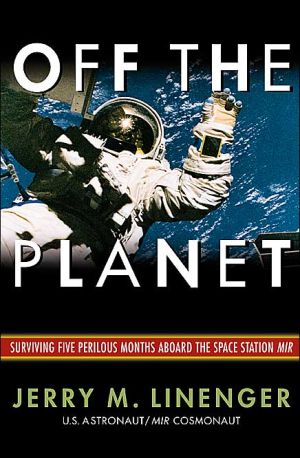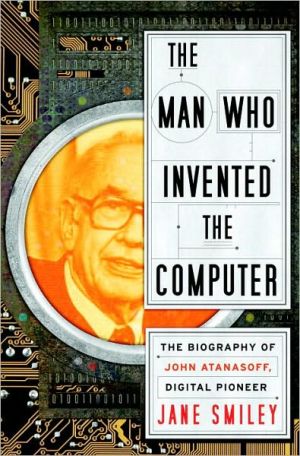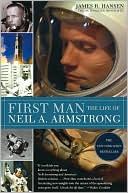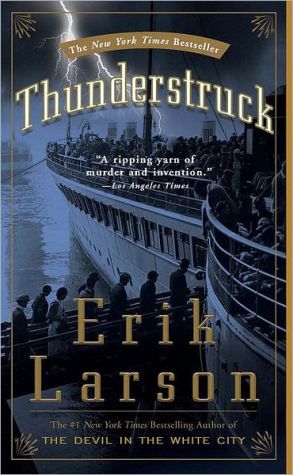Off the Planet: Surviving Five Perilous Months Aboard the Space Station Mir
“An engrossing report.”—Booklist\ “Vividly captures the challenges and privations [Dr. Linenger] endured both before and during his flight.”—Library Journal\ Nothing on earth compares to Off the Planet—Dr. Jerry Linenger’s dramatic account of space exploration turned survival mission during his 132 days aboard the decaying and unstable Russian space station Mir.\ Not since Apollo 13 has an American astronaut faced so many catastrophic malfunctions and life-threatening emergencies in one...
Search in google:
It was like nothing on Earth. "An unvarnished account of his near-disastrous stay, in 1997, on Russia's creaky space station...an engrossing report that NASA's publicity machine will bemoan."—Booklist. "[Linenger's] frank, personable prose shows readers what it's like to be an astronaut—or at least to be this particular astronaut, trying, along with his Russian companions, to live and work with good humor on an 11-year-old, half-broken, famously flammable space station as its air fills with antifreeze that is leaking out of shoddy cooling lines."—Publishers Weekly. "NASA astronaut Linenger spent five months aboard the Russian space station Mir, a spacecraft operating far beyond its design life. His personal account vividly captures the challenges and privation he endured both before and during his flight."—Library Journal.Capt. Jerry M. Linenger, M.D., Ph.D., is a retired U.S. Navy flight surgeon and NASA astronaut. A naval academy graduate, Dr. Linenger holds a doctorate in epidemiology, a master's in systems management, and a master's in public health policy. He has also been awarded three honorary doctorate degrees in science. During his mission aboard Mir, he logged fifty million miles in more than two thousand Earth orbits. He was the first American to undock from the space station in Soyuz spacecraft and the first American to spacewalk wearing a Russian spacesuit outside a foreign craft. At the completion of his mission, he had spent more continuous time in space than any male American. Publishers Weekly U.S. astronaut Linenger lived on the rickety Russian space station for five months in 1997, enduring a near-fatal fire, malicious rumors, Moscow micromanagement and a near collision with an unmanned, "worthless, garbage-filled cargo-ship" called Progress. Yet Linenger's detailed and informal memoir sounds less frustrated than honestly optimistic. The author gives readers a long run-up to his five months in orbit, describing his time at the Naval Academy, his Space Shuttle experience and his life in Russia's rundown cosmonaut complex, Star City. His experiences aboard the Space Shuttle that brings him to the Mir station give Linenger an opportunity to depict the humorous side of life in orbit: he tells us, for example, how a fellow astronaut called, from space, the radio program Car Talk, and he explains how he washed and shaved (using a "specially formulated NASA shaving cream called `Astro Edge' ") while off-planet. When he arrives at Mir, the space station looks like "six school buses all hooked together"; inside, it's startlingly cluttered. The station's increasingly hazardous state confirms that the Shuttle-Mir collaborations existed less for the sake of science than for the sake of the Russian economy. Linenger's narrative could have used some editing, as when his descriptions give way to comments such as "I... really enjoy squeezing as many projects into my life as possible." Still, his frank, personable prose shows readers what it's like to be an astronaut--or at least to be this particular astronaut, trying, along with his Russian companions, to live and work with good humor on an 11-year-old, half-broken, famously flammable space station as its air fills with antifreeze that is leaking out of shoddy cooling-lines. 16 pages of photos not seen by PW. (Sept.) Copyright 1999 Cahners Business Information.
Preface1Looking Upward32Becoming an Astronaut53Hello, Russia164Hanging Out in Star City285Training, Russian Style386Tomorrow, Mir487Crew Quarters578Off to Work649Docking a One-Hundred-Ton Space Shuttle7510My First Days on Mir8811The Arrival of Vasily and Sasha9212"Fire!"9913An Attempted Coverup11114Cosmonauts, Da! Mission Control, Nyet!11815The Glories of Earth Gazing13516Profound Isolation14917Escaping a Near-Death Collision16018Housekeeping in Space17819Hurtling Into Nothingness18420Broken Trust19421Taking a Stroll20322Going Home21123Even the Air Tastes Sweet22024Home at Last23125Getting Back on My Feet23726Aftershock24127"Are You Glad You Flew on Mir?"246Index255
\ From Barnes & NobleThis isn't the starship Enterprise. When former U.S. Navy flight surgeon and NASA astronaut Jerry Linenger signed on for a stint on Mir, he wasn't expecting to battle power outages, chemical leaks, and a raging fire.Get the real scoop on what it was like to live on Mir from an American astronaut who logged 50 million miles in 2,000 Earth orbits.\ \ \ \ \ The Washington Post Book WorldThe author, a NASA astronaut, orbited the earth more than two thousand times in the space station Mir and became the first American to spacewalk outside a foreign spacecraft. But he paid a high price for these distinctions. Inside, Mir was as mess, and several power failures lefts its inhabitants in total darkness. Worst of all, Linenger reports, was the lack of professionalism among their Russian handlers. "Mission control in Moscow became our enemy rather than our friend." he writes, "our nemesis rather than our support structure." Mission control threatened to cut the Russian astronauts pay if they performed poorly, and dangled bonuses for doing well. And mission control's propensity to micromanage was so extreme that the astronauts had their every activity programmed down to the minute.\ \ \ Publishers WeeklyU.S. astronaut Linenger lived on the rickety Russian space station for five months in 1997, enduring a near-fatal fire, malicious rumors, Moscow micromanagement and a near collision with an unmanned, "worthless, garbage-filled cargo-ship" called Progress. Yet Linenger's detailed and informal memoir sounds less frustrated than honestly optimistic. The author gives readers a long run-up to his five months in orbit, describing his time at the Naval Academy, his Space Shuttle experience and his life in Russia's rundown cosmonaut complex, Star City. His experiences aboard the Space Shuttle that brings him to the Mir station give Linenger an opportunity to depict the humorous side of life in orbit: he tells us, for example, how a fellow astronaut called, from space, the radio program Car Talk, and he explains how he washed and shaved (using a "specially formulated NASA shaving cream called `Astro Edge' ") while off-planet. When he arrives at Mir, the space station looks like "six school buses all hooked together"; inside, it's startlingly cluttered. The station's increasingly hazardous state confirms that the Shuttle-Mir collaborations existed less for the sake of science than for the sake of the Russian economy. Linenger's narrative could have used some editing, as when his descriptions give way to comments such as "I... really enjoy squeezing as many projects into my life as possible." Still, his frank, personable prose shows readers what it's like to be an astronaut--or at least to be this particular astronaut, trying, along with his Russian companions, to live and work with good humor on an 11-year-old, half-broken, famously flammable space station as its air fills with antifreeze that is leaking out of shoddy cooling-lines. 16 pages of photos not seen by PW. (Sept.) Copyright 1999 Cahners Business Information.\ \ \ \ \ Library JournalNASA astronaut Linenger spent five months aboard the Russian space station Mir, a spacecraft operating far beyond its design life. His personal account vividly captures the challenges and privations he endured both before and during his flight: corrupt Russian officials demanding bribes to clear airport customs, substandard living conditions aboard the spacecraft, an on-board fire, and a lack of support from NASA administrators more eager to preserve the politically expedient U.S.- Russian partnership than support its own astronauts. Linenger's pessimistic conclusions regarding the potential success of this partnership for the International Space Station program, currently on hold owing to Russia's failure to provide the U.S.-funded Service Module, carry a hard-earned insider's authority. Recommended for public libraries.--Thomas J. Frieling, Bainbridge Coll. Lib., GA Copyright 1999 Cahners Business Information.\ \








